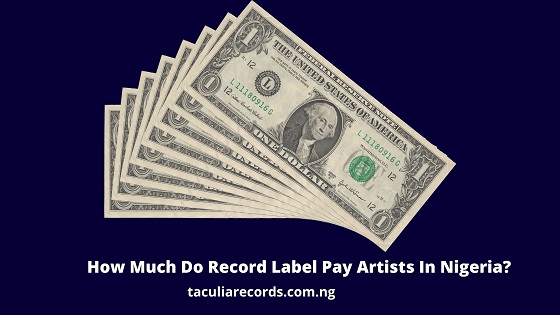This is one of the most asked questions I see from upcoming artists, and I understand why. Everybody wants to know the money side before committing their future to a label.

But the problem is that many people are searching for a fixed figure, when in reality, record labels in Nigeria do not pay artists one universal amount.

In this article, I’ll break it down honestly, from an insider perspective, so you understand what labels actually pay, how they structure payments, and why your value determines everything.
How Much Do Record Labels Pay Artists In Nigeria
Record labels in Nigeria do not pay artists a fixed salary. Instead, payment depends on the type of deal, the artist’s bargaining power, and how much value the label believes the artist can generate.
Payments usually come in the form of advances, profit splits, royalties, or full-service funding rather than monthly wages.
This payment structure ties directly to the process explained in how to get signed to a record label in Nigeria, because the better positioned you are before signing, the better your deal.
Why Record Labels Don’t Pay Monthly Salaries
Record labels are businesses, not employers.
They invest in artists the same way investors fund startups.
If you’re expecting a monthly paycheck just for being signed, you’re already misunderstanding the system.
The Different Ways Record Labels Pay Artists In Nigeria
Labels pay artists using structured deals, not handouts.
Here are the most common models.
Advance Payments
An advance is upfront money given to an artist before revenue is generated.
This money is not free.
It is recovered from the artist’s future earnings.
Royalties
Royalties are percentages paid to artists from music revenue.
The percentage depends on the deal structure.
This connects directly to how record labels in Nigeria make money.
Profit Sharing
Some labels split profits after expenses.
This model favors artists who already have traction.
Full-Service Deals
In this case, the label funds production, marketing, branding, and distribution.
The label earns more control in return.
Typical Advance Ranges In Nigeria
For upcoming artists, advances can range from small support funds to moderate launch budgets.
For established artists, advances can be significantly higher.
Your leverage determines the figure.
What Determines How Much A Label Pays You
Labels don’t guess.
They analyze value.
Your Existing Fanbase
Artists with real audiences command better deals.
Your Streaming Numbers
Data speaks louder than talent.
Your Brand Image
Labels invest in marketability.
Your Consistency
Consistency reduces risk.
Why Many Artists Feel Underpaid
Most artists sign too early.
They bring little leverage.
History explains this, as shown in the first record label in Nigeria, where labels always prioritized control.
Do Record Labels Pay For Living Expenses
Sometimes.
But only when the label believes it protects their investment.
The Difference Between Indie And Major Label Payments
Indie labels may offer smaller advances but better splits.
Major labels offer bigger money with heavier control.
How Contracts Affect Artist Payment
Contracts define everything.
Never assume.
This is why understanding the role of record labels matters before signing.
Why Some Artists Earn Millions While Others Earn Nothing
Payment follows performance.
Labels don’t reward hope.
Does Getting Signed Guarantee Financial Success
No.
It guarantees opportunity, not money.
What Labels Expect Before Paying Big Money
Artists must prove scalability.
Potential is not enough.
The Reality Of Artist Advances
Advances are loans against your future.
Many artists don’t understand this.
How Artists Can Increase Their Earning Power
Build audience first.
Own your brand.
Understand distribution.
Where Taculia Records Stands On Artist Payment
At Taculia Records, we believe payment must align with growth and sustainability.
We structure deals based on realistic performance, not hype.
Why Education Is More Important Than Signing Fast
Knowledge protects artists.
Ignorance costs careers.
How Payment Links Back To Getting Signed
Your deal begins before your contract.
That’s why I always advise artists to study how to get signed to a record label in Nigeria deeply.
Final Thoughts On How Much Record Labels Pay Artists In Nigeria
Record labels don’t pay salaries.
They invest.
The better your value, the better your pay.
If you want real money in this industry, focus less on signing and more on building leverage.

